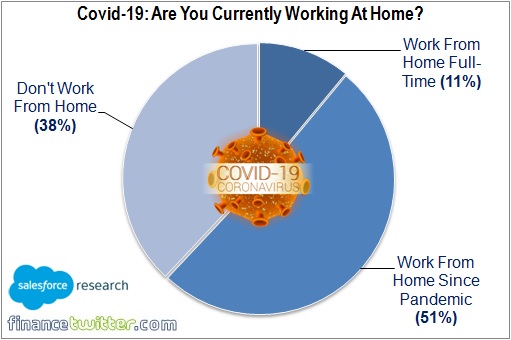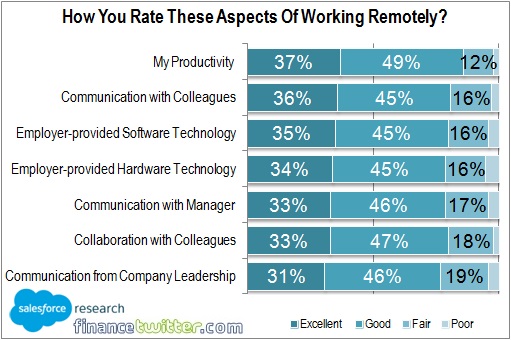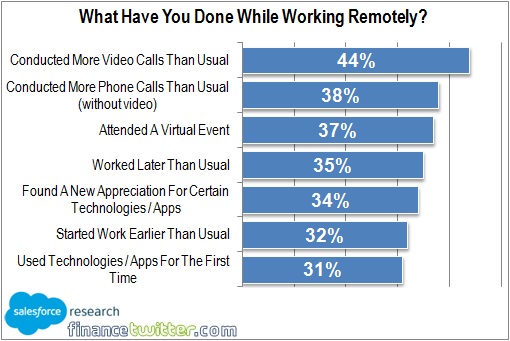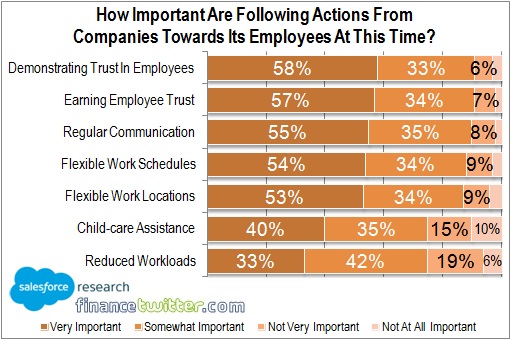The concept of “work from home” or remote work has been in the market for decades – even centuries. Some said working remotely has been around between 1.4 and 1.9 million years ago. Obviously, modern office did not exist back then. Communities would pool their resources to make tools, hunt animals, gather fruits, ground grains, prepare food and make clothing.
Fast-forward to the “Medieval Period”, most working-class English people lived and worked in their homes. They trade and offered goods and services in living spaces that also served as their home. Their home was a combination of kitchen and weaving workshop as well as a center for dairy, butchery and tannery. Bakers, shoemakers, blacksmiths are examples of professions who worked from home.
The Industrial Revolution was arguably the period, which brought changes to a new way of working. The birth of factory jobs forced men and women to leave their comfort house and worked in an outside world. The modern office takes shape at the dawn of the 20th Century, which saw the emergence of office towers of Chicago and New York.

The concept of office was revolutionized with the invention of Morse’s telegraph, Bell’s telephone and Edison’s electrical machines. The World War II was particularly important because the wartime innovations created what PricewaterhouseCoopers called the biggest disruptor of all – technology. In 1942, the world’s first electronic digital computer was built at Iowa State University.
That computer not only helped crack enemy codes during the World War II, but also laid the foundation for the future “work from home” initiative. In 1964, when IBM introduced a magnetic-card recording device into a Selectric typewriter, not many realized that the early word processor that could store information will soon become the start of computer-based work.
In the 1980s, companies like IBM began experimenting with “flexible work” (working partially from home) when it installed “remote terminals” in several employees’ homes. Those in the Information Technology (IT) or the Computer Science industry might still remember the good old days of Hayes Smartmodem, introduced in 1981.

In the early 1990s, armed with a 9.6 Kbit/s Hayes modem, a super-heavy computer and a pager, IT support would provide support for company’ mission critical business system. Upon receiving calls or pages, they would dial into company’s server using the ancient modem to fix UNIX operating system or repair Oracle or Informix corrupted databases.
However, working at home has failed to go full blown. In fact, technology companies like IBM or Yahoo, the same organizations that promoted the idea of work “anytime, anywhere” have cancelled “work from home” policies to bring employees back to the offices. Besides Internet bandwidth issue, it was perceived that only working in the office allows communication, collaboration, coordination and team building.
“If people work at home, how can one tell how well they are doing or whether they are working at all?” – goes one of the famous arguments that argue working remotely isn’t a viable solution. That argument was published in a 1979 Washington Post article and continues to be used by bosses or employers today – year 2020 – to reject the concept of “work from home”.

Human being human, the supervisors or bosses distrust their subordinates of being capable to manage their time professionally. The bosses believe the only way to ensure their staff will behave and do their jobs accordingly is when they are physically monitored. Distraction and directionless are some of the reasons. In short, the supervisors or managers do not trust their staff.
The Covid-19 pandemic, however, may change the work from home landscape entirely. In a latest survey (May 1-2) done by Salesforce Research, it has been discovered that working from home as a result of Coronavirus has had only 1% reduction in work productivity. And more than 40% of workers would prefer to work remotely full time in the future.
About 62% of employees surveyed said they are currently working from home – 11% work from home full-time while 51% have been working from home since the Coronavirus outbreak. Only 38% said they were not work from home. The survey also found that 44% employees have conducted more video conferencing than usual since they started working from home.


Other discoveries included:
- 86% of remote workers have rated their productivity as excellent or good.
- 81% of employees who work from home rate their communication with colleagues as excellent or good
- 79% of remote workers rate communication from manager as excellent or good
- 91% of remote workers said it’s important for companies to demonstrate trust in employees
- 91% of remote staff said it’s important for companies to earn employees’ trust
- 88% of remote employees think flexibility in work schedules is important
Interestingly, as a result of the Coronavirus pandemic, the study shows a staggering 80% of employers have actually provided an increased flexibility or option to work remotely. This is a good sign that companies – either willingly or not – have started to embrace the work from home culture in the eventuality that the virus stays for years and becomes part of our life.


Exactly how long Covid-19 will stay with us? A recent study headed by Dr. Kristine A. Moore, medical director at the University of Minnesota, included pandemic experts from Harvard and Tulane universities, says that if Covid-19 follows the pattern of the 1918 Spanish flu, the Covid-19 pandemic will most likely last up to 2 years. And its second wave could be worse.
Yes, even as American states and President Donald Trump begin to allow businesses to reopen and force employees who still have jobs to risk their health to work, some America’s “tech giants” are assuring its employees that they can work remotely from home until the Coronavirus is completely gone. For example, Google and Facebook workers will not go back to the office until 2021.
While Facebook said it plans to start opening most of its offices on July 6, it also informed its 48,000 full-time employees who can work remotely will be given the option to continue doing so through the end of the year. Currently, more than 95% of the company’s full-time workers are working from home, and plans to hire at least 10,000 more in product and engineering roles.

CEO Mark Zuckerberg said – “Most Facebook employees are fortunate to be able to work productively from home, so we feel a responsibility to allow people who don’t have this flexibility to access shared public resources first. I hope this helps contain the spread of COVID-19 so we can keep our communities safe and get back up and running again soon.”
Google has revealed how the company’s offices will slowly begin reopening as early as June, but only 10% to 15% of workers will be allowed in the office at any time. Google chief Sundar Pichai wrote in a May 8 memo that most employees will be required to stay home, potentially through the end of 2020. Mr. Pichai wrote to full-time employees – “We’re starting to really get the hang of these virtual meetings.”
Microsoft, meanwhile, has extended “work from home” policy to the end of October. It has also offered an additional 12 weeks of paid emergency leave to its 151,000 employees in case they need to take time off during the crisis. Amazon, while allowing corporate employees to work remotely until at least October, its warehouse workers are still required to work on site.

In a company-wide email sent on Tuesday, Twitter chief executive officer Jack Dorsey said that the company will allow its employee to work from home – “FOREVER”. The company has “strongly encouraged” its workers to work from home since 2 March and made it a mandatory for employees to work from home starting 11 March.
In the same breath, Twitter has already suspended almost all employee business travel and all of its events until 2021, while also at the same time give employees extra allowances to buy home office supplies including desks and desk chairs. Even for employees who want to return to the office, they will need to wait until at least September.
Another survey conducted in April 17-22 by staffing firm Robert Half International also shows that about 77% of Americans who previously worked in an office environment are working at home. Of those surveyed, 60% said their work or life balance has improved without the hassle of travelling and 79% want employers to let them work from home more frequently in the future.

However, while remote workers appreciate the opportunity to work from home, at the same time, they were concerned about their future. The survey by Salesforce Research shows 60% of workers agree that they have the skills demanded by employers. But 48% still worry about losing their job and 41% are considering a career change. A whopping 69% believe Covid-19 will permanently change the nature of work.
Other Articles That May Interest You …
- Going Nuts – 72% Americans Will Hit Emotional Breakdown If Lockdown Orders Are Not Lifted By Mid-June
- Stay Cool – This Top Professor Claims His Data & Statistics Prove That Covid-19 Has “Lifespan” Of Only 70 Days
- 22 Million Jobless – Desperate Trump Blames China & Declares Worst Is Over, Despite Coronavirus Deaths Hit New Record
- IMF – The “Great Lockdown” Is Set To Triggers The World’s Worst Recession Since The 1929 Great Depression
- 3 Coronavirus Variants Discovered – Surprisingly, “Type-A” Found In Americans, Wuhan’s Type-B And Type-C In Europe
- USA vs Europe – The War For Face Masks Get Ugly As The U.S. Accused Of Piracy & Paying 3 Times Cash
- The World Is Working On 20 Coronavirus Vaccines – But It Could Take Up To 18 Months
- China Appears To Be Winning The Coronavirus War, And Other Countries Are Studying How The Chinese Did It
- Arabs Conspiracy Theories – Coronavirus Is The U.S. & Israel Biological Warfare To Cripple China’s Economy & Reputation
- Flashback To 1994 – 15 Unforgettable Memories About Past Technology

|
|
May 14th, 2020 by financetwitter
|


|

|

|

|

|

|




























It won’t change anything in Malaysia.
A substantial part of our workforce do not work when they are at their workplace, it will be fanciful fairy tale to expect them to work at home.
If Malaysians are capable of working, we won’t need to such a big workforce of foreigners.
And the civil service does not need to be so bloated, six doing the work of one, too much work to do, but nothing gets done.
That’s not to say our garbage clown moron politicians know anything about work, either.
If they do, Malaysia would not be just another “sh*th*le” country.
Even to many Malaysians.